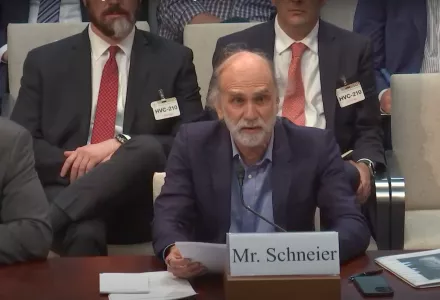Bruce Schneier's testimony begins at 1:14:35.
Excerpt from Bruce Schneier's Testimony
Data security breaches present significant dangers to everyone in the United States, from private citizens to corporations to government agencies to elected officials. Over the past four months, DOGE’s approach to data access has massively exacerbated the risk. DOGE employees have accessed and exfiltrated data from a variety of government agencies in order to, in part, train AI systems. Their actions have weakened security within the federal government by bypassing and disabling critical security measures, exporting sensitive data to environments with less security, and consolidating disparate data streams to create a massively attractive target for any adversary.
Data consolidation might seem harmless or even positive, but we have to understand what’s at stake when our data gets consolidated. Data is power. Any entity, whether public or private, that holds data about individuals has some ability to understand, predict, and manipulate their behavior. For example, major tech companies use people’s individual data to deliver advertising that shapes what we buy and even what we believe.
Our government collects much broader and more intimate data about Americans. The power of that data depends not just on the amount and sensitivity of the data, but also on how it is organized. The separation of government data into many separate stores across many agencies limits what the government--and potential malicious actors--can do with it. Accordingly, significant security, privacy, and liberty interests are built into that separation. Connecting disconnected data stores represents a massive increase in the power of whoever holds that data.
Whether you fear government tyranny, attacks from foreign adversaries, or attacks from domestic malicious actors, the AI-fueled consolidation of citizen data should make your fears grow. If the consolidation is carried out recklessly and in secret, as DOGE affiliates are largely doing, this new and unchecked power presents serious risks to every American.
Read Schneier's full written testimony




